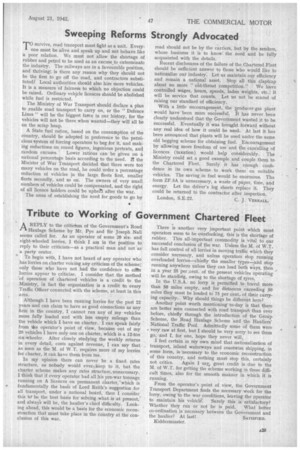Tribute to Working of Government Chartered Fleet
Page 25

If you've noticed an error in this article please click here to report it so we can fix it.
A REPLY to the criticm of the Government's Road r-k Haulage Scheme by Mr. Pye and Sir Joseph Nall seems called for. As an operator of some 20 sixand eight-wheeled lorries, I think I am in the position to reply to their criticism—as a practical man and not as a party orator.
To begin with, I have not heard of any operator who has lorries on charter voicing any criticism of the scheme; only those who have not had the confidence to or lorries appear to criticize. I consider that the method of operation of chartered vehicles is a credit to the Ministry, in fact the organization is a credit ta every Traffic Officer connected with the scheme, at least in this area.
Although I have been running lorries for the past 22 years and can claim to have as good connections as any firm in the country, I cannot run any of my vehicles more fully loaded and with less empty mileage than the vehicle which I have on charter. I can speak fairly from *e operator's point of view, because out of my 20 vehicles I have only one on charter, which is a 12-ton six-wheeler. After closely studying the weekly returns in every detail, costs against revenue, I can say that as soon as the M. of W.T. requires more of my lorries for charter, it can have them from me.
In my opinion there can never be a fixed rates structure, as nobody would ever.keep to it, but the charter scheme makes any rates structure.unnecessary. I think that if every operator had all his pre-war tonnage running on A licences on permanent charter,' which is
• fundamentally the basis of Lord Reith's suggestion for all transport, under a national board, then I consider this td be the best basis for solving what is at present,and always will be, the haulier's chief difficulty. Looking ahead, this would be a basis for the economic reconstruction that must take place in the country at the conclusion of this war.
There is another very important point which most operators seem to be overlooking, this is the shortage of rubber. This all-important commodity is vital to our successful conclusion of the war. Unless the M. of W.T. has full control of all lorries in moving traffic which they consider necessary, and unless operators stop running overloaded lorries—chiefly the smaller types—and stop running anywhere unless they can load both ways, then in a year 25 per .cent. of the present vehicles operating will be standing, owing to the shortage of tyres.
In the U.S.A. no lorry is permitted to travel more than 50 miles empty, and for distances exceeding 50 miles they must be loaded to 75 per cent.. of their carrying capacity. Why should things be different here?
Another point worth mentioning' to-day is that there are better men connected with road transport than ever before, chiefly through the introduction of the Group Scheme, the Road Haulage Scheme and the Hauliers' National Traffic Pool. Admittedly some of them were • very raw at first, but I should be very sorry to see them go, and 1, for one, hope they never will.
I feel certain in my own mind that nationalization of transport, inland waterways and coastwise shipping, in , some form, is necessary to the economic reconstruction of this 'country, and nothing must stop this, certainly not critics. Again I say,,, great credit is due to the M. of W.T. for getting the scheme working in these difficult times, also for the smooth manner in which it is running.
From the operator's point of view, the Government Transport Department finds the necessary work for the lorry, owing 'to the war conditions, leaving the operator
to maintain his vehiclg: Surely this is satisfactory? Whether they run or not he is paid. What better co-ordination is necessary between the Government and the haulier? At last! SATISFIED. Kidderminster.




















































